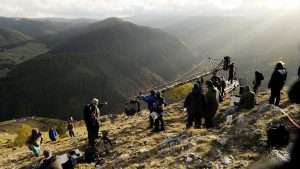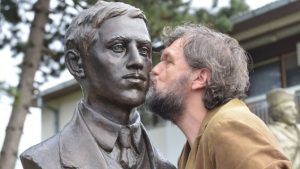A few days ago, during my last visit in Sofia, I had an opportunity to watch an interesting Bulgarian feature film (co-produced by Germany, Croatia and Macedonia); therefore today a film, not a book review.
Borders are a sad reality for many people; especially for those who want to cross them and can’t – but frequently also for those who protect them or live near a border. It is one of the twisted ironies of recent European history that just when we all thought that with the fall of the Iron Curtain barriers that prevent people from traveling freely (and where you are shot at or even killed just because you want to exercise an elementary human right) are a thing of the past, new obstacles are being erected and sometimes even in the same places where the old borders were.
But now, the direction from which people want to cross to another country is frequently reverse: while the Southern border of Bulgaria to Greece and Turkey was heavily protected in the time of communism in order to prevent people from leaving the Eastern block via the Rhodopi mountains, the same area is now guarded and fenced against refugees from Syria and other Mediterranean and African countries who desperately try to come to Bulgaria and the European Union.
Stephan Komandarev, a Bulgarian film director best known for his adaptation of Ilija Trojanow’s novel Die Welt ist gross und Rettung lauert überall (The World is Big and Salvation Lurks Around the Corner) tells in his new movie The Judgement (Съдилището) the story of a man whose life is virtually destroyed by the border.
Mityo (Assen Blatechki), a widower in his 40s, lives alone with his son, 18-year old Vasko (Ovanes Torosian) in a small village in the Bulgarian Rhodopes, near the Greek and Turkish border. Fanka, Mityo’s wife died after years of illness, and the relationship between father and son is strained for various reasons which become clear while the story unfolds.
The film takes its time to show Mityo, Vesko, and the other villagers in their daily life. The village is poor, and when the local dairy factory for which Mityo is collecting the milk from the local farmers with his cistern truck is closing and leaving him jobless, the situation becomes pretty desperate for him. That the electricity is switched off because of his unpaid bills is a very small problem – but how he is supposed to pay back the mortgage on the small house where he is living with his son which he took years ago to pay for Fanka’s unsuccessful medical treatment, is something about which he has no idea. An attempt to sell his truck fails and when someone turns up to prepare the house to be auctioned off in a few weeks time for the bank, it is obvious that Mityo is in dire straits. Finally he gives in reluctantly to work for a man that everyone knows as The Captain (Miki Manojlovic), since he is a former commanding officer of the border troops in that area during the time of Communism.
The work Mityo has to do is to help to bring illegal immigrants over the mountains to Bulgaria, a work for which he is paid well because it is rather dangerous. Not only because of the danger to be spotted by the border guards, but also because the path through the mountains is rather challenging, especially the area near by a dangerous cliff that is also known as The Judgement.
As the story advances, Vesko finds out that his father was as a young man not only serving in the border troop unit of the Captain, but also that he is hiding a dark secret. Once, in 1988, he killed a young East German couple that tried to flee over the mountains, exactly at the spot called The Judgement.
The movie focuses strongly on the father-son conflict and I found it psychologically very interesting how Mityo tries to come to terms with his past. The Captain forced him at gunpoint to shoot at the refugees and to toss the bodies over the cliff (while the girl was probably still alive). After this traumatic experience, Mityo had a mental breakdown but was saved as he describes it by his future wife Fanka.
Finally, when his son presents him the evidence of his involvement in the killing of the young couple, Mityo reveals everything to his son and it seems a kind of relief for him. When he is going on a last dangerous assignment, things go terribly wrong in the moment when the group (this time with the Captain and also Vesko, who was called for help by his father) arrives at The Judgement cliff.
I liked about the movie that it starts comparatively slow-paced. Although the father-son conflict and later the conflict between Mityo and the Captain are the most important lines of the story, there are also some other credible and interesting characters that add to the flavor of this movie. Vesko develops a close relationship with Maria, a girl in his class. There is also the old doctor, a friend of Mityo who plays a small but somehow important role. There is Kera, a lonely woman living next door to Mityo and his son who tries to get closer to the very distanced Mityo. And there is Zhoro, another mountain guide, who provides the refugees with tea and wafers and who is smart enough to get out of this dangerous business with the Captain in time.
The Captain, Mityo’s nemesis, is a typical product of the times: he was a fanatic in the time of communism who took pride in “defending” his country by shooting those who tried to flee, and now he is a “businessman” with a big brand new car and an impressive fortress of a house. For him, the refugees that he is smuggling across the border are a source of income only. He is without respect for these people he calls contemptuously “garbage” (боклуци), and when the last group reaches The Judgement while fleeing from the border guards, he asks Mityo to throw a sick child down the cliff because it slows down the group too much. But times have changed now, Mityo is not the same person he used to be as a young recruit…
Actors and dialogues in this movie are excellent (I hope also the translation/dubbing will be very good). You will see also breathtaking panoramas of the Rhodopi mountains, a truly magical place.
The movie asks very interesting questions about – not only – Bulgaria’s past and shows how ordinary people are burdened by it (even the generation that was born after the changes); how to come to terms with personal guilt and how to learn to talk about the most haunting experiences in life with those who are closest to you. A deeply human story that you shouldn’t miss when you have the opportunity to watch it. I can strongly recommend it without reservations.
The Judgement starts in 60 movie theaters in Germany (the biggest number of copies ever for a Bulgarian movie in Germany) under the title The Judgement – Grenze der Hoffnung on April 23. The film will be distributed hopefully also in your country. It was recently also screened on many international film festivals, so chances you can watch it soon are probably not so bad.
I watched the movie in Bulgarian without subtitles – and I had the whole cinema for myself, there were no other people. Quite an interesting experience.
The official website of the film: http://www.thejudgementmovie.bg
© Thomas Hübner and mytwostotinki.com, 2014-5. Unauthorized use and/or duplication of this material without expressed and written permission from this blog’s author and/or owner is strictly prohibited. Excerpts and links may be used, provided that full and clear credit is given to Thomas Hübner and mytwostotinki.com with appropriate and specific direction to the original content. © photo BGNES





 Facebook
Facebook RSS
RSS Twitter
Twitter